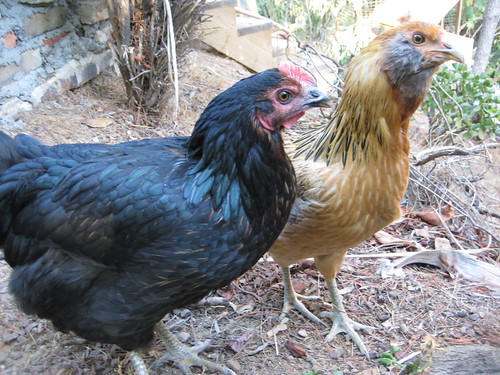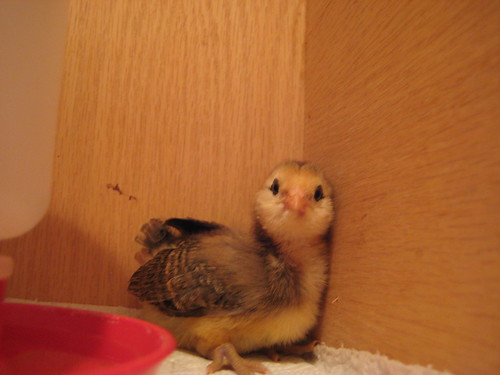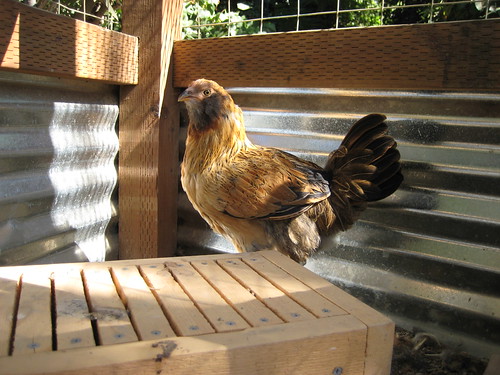
Every once-in-a-while, someone contacts me through this blog looking for advice about chickens. Since I am always happy to lure more people into the life of backyard chicken-keeping, I usually set up a little meeting with my new blog friends (if they're local), and proceed to lay all my chicken knowledge on them. Hopefully, they find it helpful.
A couple of months ago, while preparing to meet with my new chicken-friend Noah, I started thinking about my top chicken tips. What have a learned in my two years of chicken ownership that would be worth sharing with others? After mulling it over for a while, I came up with the following random assortment of tips, all pulled from personal experience. I hope any of you who are contemplating chicken ownership find this advice useful.

Be careful where you purchase your chicks or chickens.
Unfortunately, I learned the hard way that it really matters where you get your chickens. My first two hens, Jackie and Lisa, died of Marek's disease, which I suspect they caught due to the less-than-sanitary conditions at the feed store where I bought them. I lost another pullet, Becky, to respiratory disease because of similarly shady sanitation at a different feed store. These losses were very sad, but you can avoid my mistakes by making sure you get your chickens from a clean feed store or directly from a hatchery.
At the feed store, make sure the day-old chicks are kept separate from other animals in a clean, well-ventilated brooder. Examine the chicks or hens carefully before you buy them. Look for signs of disease--listlessness, funny smell--and overall cleanliness. Ideally, get your chicks from a place that only sells chicks. Just-hatched chicks are usually disease-free; they catch diseases from the older fowl around them.
Start with at least 3 hens.
Hens need friends, so you should definitely get at least two chickens, but three is safer. That way, if you lose a chicken to disease or predators, you won't end up with one lonely hen. You can always get a replacement chicken, but hens that are raised together from the beginning tend to get along better. Plus, three hens are really no more trouble that two. In fact, odds are you'll be lusting for more chickens by the time your first batch gets to laying age--if not sooner.

Plan for predators.
When it comes to predators, chickens are, um, sitting ducks. They don't really have any way of protecting themselves, so it's your job to keep them safe. The best way to do this is to build a very secure coop and run, considering all the possible predators that might come after your girls or their eggs. In most urban/suburban environments, these include: raccoons, skunks, rats, dogs and snakes. We also have foxes and coyotes in our neighborhood, although I've never seen them in the yard. Still, I'd rather be safe than wake up to a bloody chicken crime scene.
Here are some coop-building tips that have kept our chickens safe from predators for several years:
- Elevate your coop to keep predators and pests from burrowing underneath and/or making their homes below your chickens
- Bury wire or metal at least 6" deep around the edge of your run to keep predators from digging under the walls
- Put a protective barrier--metal, wood or hardware cloth--up to chicken-height around the base of your run. This will keep raccoons from reaching in and grabbing your hens (it happens)
- Lock your doors and windows. Some animals are crafty enough to open coop doors that are simply closed and not latched
- Chicken wire is too wimpy. Use a heavy-gauge wire fencing that can stand up to clawing, jumping or biting
Never chase a chicken!
As I learned during the Great Chicken Escape of 2008, chasing a chicken is usually a bad call. They may be small, but most hens are both quick and wily. If you try to chase a chicken down, you will likely end up out of breath, frustrated and yelling swear words your hen. So, if you need to get your hen to go back into her run, I highly recommend using trickery or bribes.
One of my best tricks involves pretending to find something extremely exciting in the dirt or straw. Basically, I scratch around in the soil with my hands and act all excited. Chickens are pretty curious--and greedy--so they'll probably come running to see what you've found. The scratching in the dirt trick works pretty well on my hens, and as you get to know your girls, you can discover what peaks their interest and use it against them later.
To bribe your chickens, food is the obvious choice. This can range from a handful of weeds to a special treat like meal worms or their favorite fruit. It really depends on your chickens' taste and how much they want to stay outside. Sometimes, you can even trick your hens with a fake bribe by shaking their feeder or bringing out the scoop you use to refill their feed. Chickens aren't as dumb as you might think, though, so don't use the fake out too often or they'll stop trusting you.

Well, I think that's all the chicken wisdom I can dispense for today. I have a few more thoughts that I'll share in a second post soon. For now, I hope you find this information useful and that perhaps it starts you on the road to getting some hens of your own. It is baby chick season after all!


Totally GREAT post! :-)
I also loved the post! I definitely agree with you when you said that people will probably end up wanting another hen after their chicks have grown up. I just found out that one out of my two chicks was a rooster this week and had to get rid of him :( I got a welsummer hen to take his place. What kind of chickens do you have?
http://theinsidecoop.wordpress.com/
a shame to what happened to your chicks but atleast now you know better. my wife and i have always wanted to have a few chickens ourselves so this will come in handy one day. and great pictures, the second is begging to be called "nobody put chick in the corner." lol...